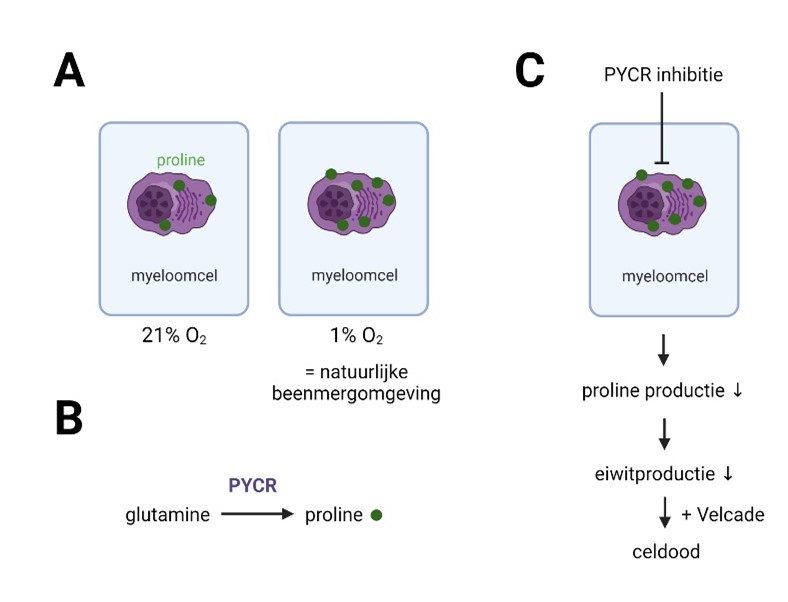Researchers at the Vrije Universiteit Brussel, led by Prof Dr Eline Menu, have investigated how changes in metabolism contribute to cancer resistance and relapse. They identified the amino acid proline as an important food source for the growth of malignant plasma cells, the hallmark phenomenon in myeloma. Their award-winning research, conducted by doctoral student Inge Oudaert, reveals a new potential treatment strategy in the quest for cancer cure.
Multiple myeloma, also known as Kahler’s disease, is a blood cancer in which uncontrolled growth of plasma cells occurs in the bone marrow. This large amount of abnormal cancer cells takes the place of other cell types, such as red blood cells, platelets or normal white blood cells, which also impairs their functions. As a result, patients often experience anaemia, bruising and prolonged bleeding, as well as an increased risk of infection. Every year, about 1,000 patients in Belgium are told that they suffer from multiple myeloma. About 40% of these will die within five years.
Incurable disease
The Hematology and Immunology research group, part of VUB’s Oncology Research Center, has been carrying out successful research into this blood cancer for years. Since this disease is still incurable, these researchers continue to do their utmost to investigate its development and progression and to test new treatment methods.
Discovery of the role of proline
Over the past three years, the research team has focused on what nutrients these cancer cells need to keep growing. One of these nutrients turned out to be proline, an amino acid needed for protein production, but also for DNA/RNA production, the removal of toxins from the body and the production of energy. An initial experiment showed that myeloma cells converted more glutamine to proline when cultured in a low oxygen environment, a typical feature of the natural bone marrow environment. Proline production itself was also increased in an oxygen-deficient environment. Furthermore, myeloma patients in relapse also showed higher expression of the PYCR gene, which is responsible for proline production.
Initial tests
To see if proline inhibition would be a good treatment option, cancer cells were treated in the lab with a PYCR inhibitor, as well as PYCR gene expression blocked using small interfering RNA. PYCR inhibition reduced the viability and multiplication of the cancer cells, and also caused cell death of the cancer cells. Further investigation into the underlying changes showed that the PYCR gene is important for protein, DNA and RNA production and that PYCR inhibition reduced these processes, leading to slowed cell growth of the cancer cells and ultimately their cell death.

Promising results
Myeloma patients are currently treated with a combination therapy consisting of multiple drugs including Velcade. To evaluate whether PYCR inhibition could also be part of this, myeloma cells were treated simultaneously with Velcade and the PYCR inhibition. It was found that the combination therapy induced more cell death of cancer cells compared to the individual therapies. This combination therapy was also tested on diseased myeloma-carrying mice, where again it was able to better inhibit the disease.
Award-winning research
This research was awarded the American Society of Hematology Abstract Achievement Award at the annual hematology congress in Atlanta, USA in December 2021. It was also accepted for publication on January 7 2022 in the Journal of Experimental and Clinical Cancer Research.
